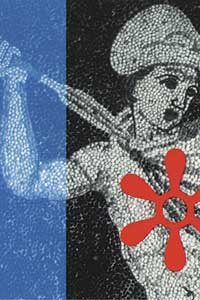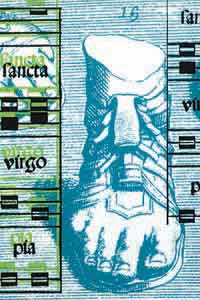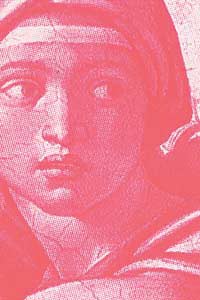Language a main theme of 22nd annual Humanities Open House
By Seth SandersNews Office
 |
The Division of the Humanities at the University will sponsor its 22nd annual Humanities Open House, a free, daylong celebration of scholarship and the arts, from 9:30 a.m. to 6 p.m., Saturday, Oct. 27. This year’s event will feature more than 50 presentations, lectures and performances presented by the University’s faculty. President Randel, a noted musicologist, will give the keynote address, &147;Music and Poetry.&148;
One of the themes this year is &147;Discovering Our Languages.” In this vein, Elena Bashir, Lecturer in South Asian Languages & Civilizations, will introduce “The Languages of Pakistan,” showcasing the vast spectrum of languages in that region, which has drawn such attention lately. In addition to the spoken languages of three major linguistic familiesóIndo-European (Indic and Iranian), Tibeto-Burman and Dravidian––the mysterious language of Burushaski, which has a yet undetermined genetic affiliation, is spoken in the northern part of the country.
 |
Bill Darden, Professor in Slavic Languages & Literatures and the College, will show what corpses have to do with language change in his talk titled “The Mummies of Ðr¸mchi, Tokharian, and the Spread of Indo-European.” Mummified corpses of Caucasoid people, dating to the second millennium B.C., have been found in Chinese Turkestan. At the same time and in roughly the same area, documents written in an Indo-European language, Tokharian, also were found. This comes as no great surprise because in the third millennium B.C., a society thought to be Indo-European speaking expanded east from the Russian steppe, occupying the Central Asian steppe. What is surprising is the claim that Tokharian’s nearest linguistic relative is Celtic. Darden will discuss these issues and others related to the question of how languages spread to and settle in new geographic areas.
Explorations of the political and social force of language will include a talk titled “Foreign Language Classroom as Territory of Encounter and Exchange,” presented by Joanna Kurowska-Mlynarczyk, Lecturer in Slavic Languages & Literatures. Drawing on her experience as an instructor of Polish at American universities, Kurowska-Mlynarczyk will discuss teaching and mastering a foreign language as a multicultural encounter. She will present class exercises that explore the communicative function of a language and enhance cultural exchange among class participants.
 |
Michael Silverstein, the Charles F. Grey Distinguished Service Professor in Anthropology, will present “Presidential Misspeakingfulness [sic],” an examination of how people view President Bush based on how he speaks. How do Bush’s speeches affect our understanding of him as a person and political actor? Silverstein will look at examples of current “presidentiary misspeakingfulness” against a background of our culture of standardization and stratification of language and with an eye to the role of language in situating leadership in this particular type of political system.
Surprising new looks at classical subjects also will be provided in “The Ancients in Action.” Walter Johnson, Professor Emeritus in Classical Languages & Literatures and the College, will present a description of the distinctions between ancient spectators of gladiator shows and modern audiences who attend movies about gladiators in his talk titled “What Russell Crowe Forgot to Tell Us About Gladiators.”
As part of “Women in Literature and History,” Christopher Faraone, Professor in Classical Languages & Literatures and the College, will discuss “Anger and Gender in Ancient Greece.” He will explore how (male) ancient Greek writers criticize anger as a sign of a loss of control, the triumph of passion over reason. They also paint women as more prone to anger than men. Yet in reality, a series of magical binding spells from antiquity suggest that the opposite was true: men were more likely to become inflamed with anger and that this was seen as natural, since anger and passion were thought central to maleness. Yet we find that women often used magical spells to curtail the anger of their husbands––an anger perceived by them as pathological.
Norman Golb, the Ludwig Rosenberger Professor in Near Eastern Languages & Civilizations and the College, will provide a window on the life of a converted Jew during the Crusades. Illuminating one of the most important sources of early Jewish music, The Memoirs of Obadiah the Proselyte and His Music will detail Obadiah’s fragmentary memoirs, describing events in the First Crusade and others of great historical interest, which were discovered piecemeal among the manuscripts of the Cairo Genizah. Golb will describe how, in 1965, he identified some musical fragments in the handwriting of Obadiah. These fragments will be played during the lecture.
William Wimsatt, Professor in Philosophy and the College, will present “Evo-Devo for Cultural Evolution: Why Memes Won’t Do.” He will criticize the popular view among advocates of cultural evolution that ëmemes,’ or bits of culture, are like genes because both self-replicate. He will show that the analogies fail: No ëmemetics’ correspond to genetics, and the search for “minimal” memes (inspired by the history of genetics) is a serious mistake. Instead, he suggests that theories of cultural evolution pay more attention to the structure of ideas and cultural practices as studied by humanists, historians and anthropologists, and in ways that show the importance of intentionality, institutions, history and contingency. These can provide some of the structure of a missing genetics and point to an alternative way to construct an evolutionary theory for culture, which parallels the latest trends in the fusion of evolutionary and developmental concerns in biology.
Additionally, two “how-to” presentations will be offered––attendees will learn how to pretend to be themselves, and then how to steam a bear. Wendy Doniger, the Mircea Eliade Distinguished Service Professor in the Divinity School and the College, will speak on “The Mythology of Self-Imitation: How to Masquerade as Yourself.” “In many myths, a double masquerade results in a moment when a person pretends to be himself: a man pretending to be a woman pretending to be a man, or a god pretending to be a human pretending to be a god,” she explained. Her presentation will then ask what these stories reveal about how individuals’ selves are built up of layers that can be put on and peeled off.
Donald Harper, Professor in East Asian Languages & Civilizations and the College, and Bruce Cost, manager of Big Bowl Restaurants, will present “How to Steam a Bear: Recipes from a Medieval Chinese Cookbook.” This presentation will feature a cooking demonstration of the gastronomic refinement and culinary techniques of ancient and medieval China as preserved in a sixth-century guide to agriculture. Composed by the gentleman farmer Jia Sixie, Qimin yaoshu (Everyman’s Essential Arts) balances exact instructions for the preparation of food with perceptive observations on the aesthetics of food.
Among the surprises in this medieval “cookbook” are the world’s oldest recipe for mustard sauce, the condiment of choice for delicate slices of raw fish (the antecedent to Sashimi); a range of charcuterie, including blood sausage; recipes for cheese, pasta and breads; and exact instructions for steaming whole bear (alongside steamed or roasted suckling pig).
Finally, a special session called “After Words: Reflections on Sept. 11” will begin at 4:30 p.m. This culminating, roundtable discussion will be moderated by Janel Mueller, Dean of the Humanities Division.
Presentations are in three sessions: 9:30 to 10:30 a.m., 1:30 to 2:30 p.m., and 3 to 4 p.m., with the keynote address from 11 a.m. to noon and the roundtable discussion from 4:30 to 6 p.m. All events are free and open to the public, but registration, which is available on the Internet at http://humanities.uchicago.edu/openhouse, is required. Those without Internet access may call the Humanities Open House office at (773) 702-4847 to receive a program and a mail-in registration package.
![[Chronicle]](/images/small-header.gif)